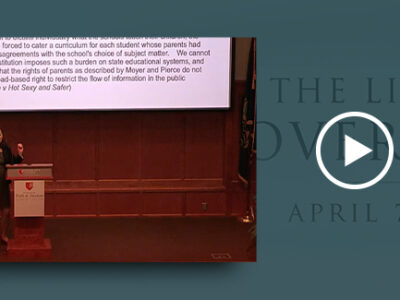Editor’s Note: The “V&V Q&A” is an e-publication from the Center for Vision & Values at Grove City College. Each issue will present an interview with an intriguing thinker or opinion-maker that we hope will prove illuminating to readers everywhere. In this first of a special two-part edition of the “V&V Q&A,” the executive director of the Center for Vision & Values, Dr. Paul Kengor, interviews Dr. Thomas J. Usher, former chairman and CEO of the U.S. Steel Corporation. This Q&A is in keeping with a long tradition of healthy debate within the conservative movement over the often contentious domestic-economic issue of free trade. On October 24 at 7:00 PM, Dr. Usher will be delivering the College’s annual Albert A. Hopeman Jr. Lecture in Science and Engineering. The title of his talk is “Engineering for Wealth Creation.”
V&V: Dr. Usher, you’re not comfortable with the dichotomy of either “free trade” or “protectionism,” or the common characterization that one is either a free trader or a protectionist. You say that the subject is more complicated. Please elaborate.
Dr. Thomas J. Usher: The reason I object to the term “protectionism” is that I would rather refer to it as simply “enforcement of our trade laws.” We in this country have laws for many things. We have laws against smuggling, obviously for many good reasons. Well, we also have laws against bad trade practices—against illegal trade practices …. Our trade laws are like any other laws; they were passed by Congress and there’s a reason for them, and that is to keep people from doing things that run contrary to a competitive situation.
Consider, for example, a situation where the more efficient/lower-cost steel producer is being undersold by a less efficient/higher-cost steel producer because the latter is either being subsidized by its government or helped by government policy [that does not] allow steel to come into the country.
Over the last decade, the cost of steel from a labor standpoint has dropped from about 50 percent of the sales dollar to about 17 percent. As for the costs of any producer bringing steel into this country … well, we can match that anywhere. So, it’s not a question of lower efficiency or lower cost. It’s more a question of whether you’re going to allow those steel producers from other countries to bring in steel and price it—on a short-term basis—at a price below their production, with the help of those governments.
Now, if you’re a free trader who says that you don’t care what the foreign government is doing, because you just want the American consumer to get a lower price, then fine. I don’t agree, but intellectually I have more respect for that position than to simply say that we are being unfairly protected.
Some people call this protectionism. But what they’re really saying is that they don’t want us to have any trade laws. They’re really saying, “If someone wants to bring something here—for whatever reason or advantage—they should be able bring it.”
V&V: You note how and why this is an unhealthy situation for a nation of entrepreneurs and investors. Explain that.
Usher: If you think about it from a business person’s standpoint, if you don’t have laws that allow an investor to know what the future is like, why would the investor ever invest in anything? Why would I build another steel plant, why would I invest in another refinery, why would I keep drilling for oil, if I didn’t know there was some type of guarantee against predatory practices? That’s why trade laws were passed…. Our view, as business people, is that if you don’t have a structure of law for capital-investment decisions, it brings in uncertainty.
V&V: You could make this same point about the purpose of IPRs—Intellectual Property Rights—of patents, trademarks, copyrights. These are actually marketplace guarantees—what is commonly called “rule of law” or a “legal framework”—that enable entrepreneurs and investors to take risks and create capital; they are a signal to investors, a signal that provides predictability and reliability in a market economy.
Usher: That’s right. I find that many free traders are much more diligent on IPRs—on laws protecting intellectual property—than they are for the enforcement of trade laws for our products.
One of the great uncertainties we always had with investment decisions was the appointment of new members to the ITC [the U.S. International Trade Commission] and whether these new “free traders” on the commission were going to enforce the law or not—that is, enforce the trade laws on the books, passed by Congress.
Look, you just can’t allow what takes place in other governments—subsidies and so forth—and then allow steel or any other product by foreign producers to come in and be priced below the cost of production simply because it benefits the American consumer in the short term.
V&V: Give us an example of foreign government intervention that hurts American steel.
Usher: Here’s an example: We can sell steel to Toyota right down here in Kentucky. That same Toyota being made in Kentucky is being made in Toyota City in Japan. Now, we can’t sell that same steel in Japan. Why not? It’s the same steel, same fenders, some of those cars are being sent over here, some are staying over there, some are going somewhere else. So, why can we sell it here but can’t sell it over there? Because they don’t have an open market. I could even put that steel on a plane and send it over there and make money.
V&V: So, in that situation, the problem for your steel company has nothing to do with inefficiency in your company?
Usher: That’s right. Look, protectionism is bad. If you have a totally inefficient industry that isn’t competitive, and you allow the government to keep pumping money into it, that’s not a good thing, it shouldn’t be protected. But that’s not the situation with our industry.
V&V: You have another example of how foreign-government intervention hurts the U.S. steel industry, this one involving Value-Added Taxes—VATs. Can you talk about that?
Usher: Many of these foreign governments have VAT taxes as opposed to income taxes. So, they produce a product over there, and that VAT is deducted, whereas over here we can’t do any deduction for our income taxes. That’s a totally unfair system to compete against.
V&V: And the reality is that most of Europe, as well as many other countries around the world, have VAT taxes.
Usher: Yes, they do.
V&V: You’ve shared with me an example based on a $100 local price of steel for the United States, China, and Germany. As that U.S. steel goes to China, it gets hit with a 17 percent VAT that raises the price of that steel to $117 in China; on the contrary, when that China steel is exported to the United States, China applies a 13 percent VAT rebate, bringing it down to $88.89. Likewise, Germany does the same thing with a 16 percent VAT and a 16 percent VAT rebate. So, their governments are giving them advantages that U.S. steelmakers do not get from our government…. In a separate point, you also make the argument that the steel industry is in fact unique and must be viewed differently from other industries. Can you address that?
Usher: I do feel that there are certain industries that are critical to a nation’s infrastructure. Right now there’s a furor over oil, over the price of gasoline. As a country, we don’t want to become dependent on foreign governments for certain things, and I think oil is a perfect example of how that has happened. If the Saudis want oil at 23 dollars per barrel, they can get that.… We have found ourselves as a nation much more dependent than I think we would want to be.
V&V: And that vulnerability, that dependence on foreigners for our oil, truly affects our foreign policy.
Usher: Yes, it affects our foreign policy, our national security, our safety. And I would put steel in that same business. We don’t want to wake up tomorrow with no steel industry in the United States. Steel is one of the most critical industries in the country. And, then, on top of that, you have trade laws being violated against that industry….




